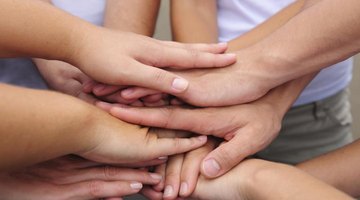Empowerment is the granting of power to perform duties and create change. To empower youth, therefore, means teaching them about their capacity to control their lives and change society -- to instill a sense of their value. Empower your students through a variety of classroom activities that will focus on these subjects.
Self-Confidence Acrostic Narrative
Have students exercise self-confidence by having them create an acrostic narrative or poem using their name. Have students write their names vertically on the left side of a sheet of paper. Then have them describe their positive traits or abilities using each letter in their name. For example, a student named Sarah may write something like this: S = Smart, A = Athletic, R = Responsible, A = Artistic, H = Happy. Younger students can use single words, and older students with stronger writing abilities can be encouraged to write phrases or poems based on these letters. This activity gets students to think about their self-worth and the positive things they bring to the world.
I Can Be Whoever I Want to Be
This activity empowers students to take charge of their lives and know that they can do anything they put their minds to by looking at famous influential figures as role models. For younger students, have a discussion about the accomplishments of people such as Albert Einstein, Amelia Earhart and Martin Luther King Jr. and how they overcame adversity and obstacles to accomplish amazing feats. Have older students do independent research on a chosen figure and write a report about their subject's life and achievements. This will inspire students to think about what they want to accomplish and know that they can achieve big things regardless of their origins.
Making a Positive Difference
Young people can experience fulfillment if given the opportunity to make an important impact on their community. Plan a class activity that promotes this. It takes a lot of planning but can be done with students of all ages. For example, conduct a food drive for a local food bank or plan a cleanup day on which students collect garbage in the schoolyard. Through these activities, students will recognize the role they play in changing things for the better and how even small gestures, such as cleaning up the schoolyard, contribute to a greater good, such as a positive community spirit.
All About Feelings
This activity helps students with self-discovery and understanding their feelings. Write questions beginning with "How do you feel when ..." on strips of paper and place them in a box. Examples of questions you can write are "How do you feel when you win a game?" or "How do you feel when someone is mean to you?" Have each student pick a question and take turns answering. When it's done as a group discussion, students can hear all the different types of emotions people feel. Empower students by telling them that as long as emotions are vented in a healthy matter, without hurting themselves or others, they have the right to express them.
Related Articles
References
Writer Bio
Based in Gatineau, Canada, Kat Walcott has been writing entertainment and informative articles since 2008. Her work has appeared in major publications including Her Campus, Equals6 and Uppercase. She holds an honors diploma in social science from Heritage College and is currently majoring in communication studies and minoring in sexuality studies.











